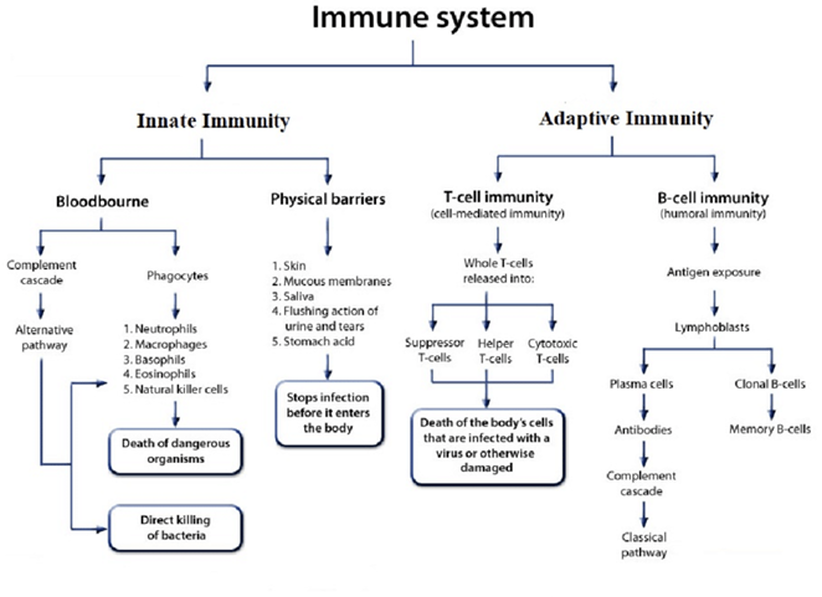|
The Human Immune System What is the immune system? We share our world with microbes, some good but others considered pathogenic, immunity is our defense mechanism which works to fight these pathogens and prevent diseases. The important thing to remember is the manifestation of pathogenic disease is totally dependent on the virulence of the pathogen and our immune system, the stronger our immune system is the easier it will be to achieve resistance against disease [1]. Our immune system is complex, made up of specialized cells, molecules and biological processes that patrols, recognises and attacks antigens which can be; bacteria, viruses, fungi, parasites, existing disease or toxins and environmental substances such as pollen) [2]. Internal Immune tissue and organs include, tonsils, adenoids, lymph nodes and vessels, thymus, spleen, peyers patches, appendix, and bone marrow, each having their own specific role. Immunity defense against pathogenic infection can occur through innate or adaptive immunity. Innate (aka natural or native) immunity is the first line of defense from pathogens attacking our body from the inside or outside. It does not require specific antigens to become responsive and can respond immediately or within hours of detecting antigens [3]. Innate immunity does not achieve immunologic memory, therefore your body will not recognize that particular pathogen if you are exposed again. Adaptive (aka specific or acquired) immunity is acquired over your lifetime. It takes over when the innate immune response can no longer cope with the pathogen. It requires specific antigens to produce a specific response. It has a memory of past exposure, in the form of antibodies which enables a quicker, stronger and more efficient immune response when you are subsequently exposed to that specific antigen [4]. A summary of innate and adaptive immunity is shown in Figure 1. Figure 1. Flow chart showing innate and adaptive immunity taken from Paul et al 2020 [5].
Many factors affect your immune system such as your age, hormones, nutrition, alcohol intake, smoking and other toxic substances. One a positive note, there are things we can do to strengthen our immunity such as, good nutrition, exercise, adequate sleep, stress management, and good hygiene. We will focus on these in part two of our human immune system series. Part three will look at the essential role of zinc within our immune system. References 1. Meagher MW. Immune system structure and function. Encyclopedia of Health Psychology. 2014;1–9. 2. Schultz KT, Grieder F. Structure and Function of the Immune System. ToxicolPathol. 1987;15 3. Cruvinel WDM, Júnior DM, Antônio J, Araújo P, Tieko T, Catelan T.Fundamentals of innate immunity with emphasis on molecular and cellular mechanisms of inflammatory response. Bras J Rheumatol. 2010;50(4):434– 461. 4. Marshall JS, Warrington R, Watson W, Kim HL. An introduction to immunology and immunopathology. Allergy, Asthma Clin Immunol. 2011;7:1–8. 5. Paul, Sujata & Hmar, Elbethel Lalthavel & Sharma, Hemanta. (2020). STRENGTHENING IMMUNITY WITH IMMUNOSTIMULANTS: A REVIEW. 7. 35-64.
1 Comment
|
News from Integrated HealthCheck out the latest news and our archive of natural information Archives
November 2021
Categories |
Contact us
|
Integrated Health
292 Cameron Road, Corner of 2nd Avenue Opening Hours 9am - 5pm Monday- Friday 930 - 5pm Saturday For dispensing herbal practitioner only items 9.30 - 4 pm Monday to Saturday If you need an item dispensed outside this time please call us and we can arrange this for you. |
Part of John's Photo Pharmacy - locally owned and operated, proudly supporting the Tauranga community since 1993.
|
© Integrated Health 2021 | Site powered by Whitfield Consulting






 RSS Feed
RSS Feed